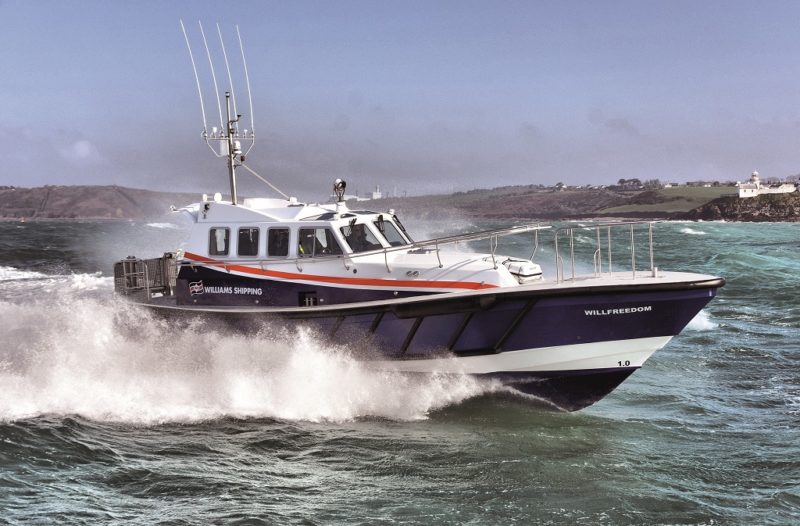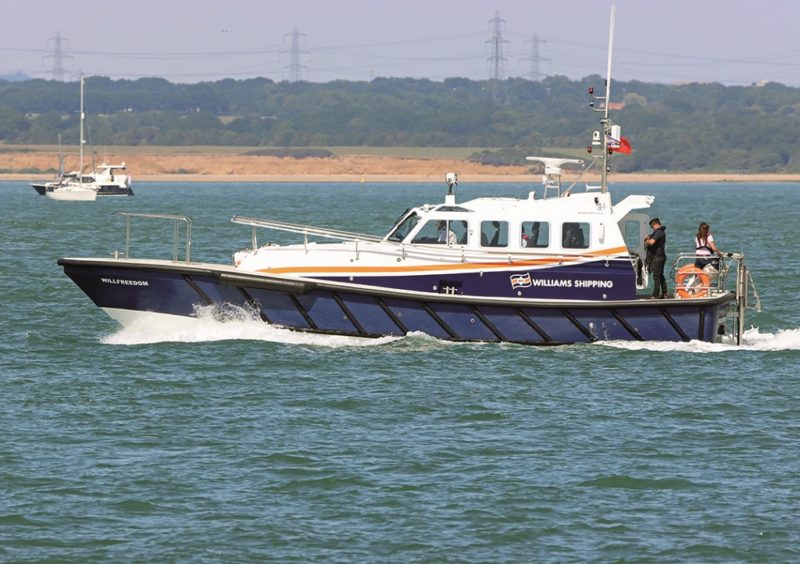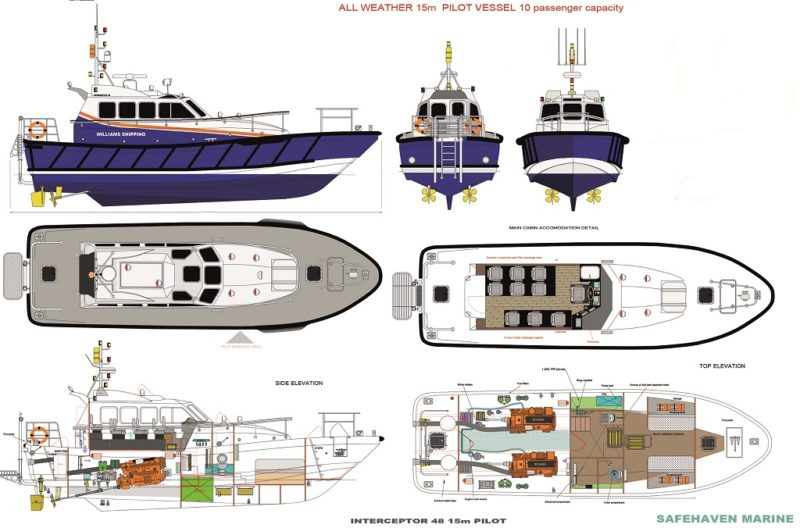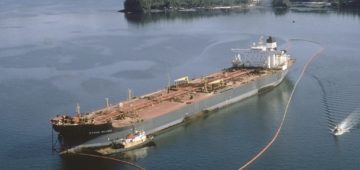The working craft that are a constant feature of our harbours, ports and waterways are often disregarded in favour of the larger sea-going vessels that share these environments. However, these working vessels are actually a major piece in the jigsaw that is today’s shipping industry. Crew transfer and Pilot Launches provide a frontline role to keep the bigger ships moving to/from ports and have to go out in all weathers. Williams Shipping of Southampton now has (at the time of writing) a fleet of four launches for various work including personnel transfer, safety patrols and surveying plus three RIBs (Willnip/Willzip and Tigershark). The launches are the Willing, Willfetch, Willventure II and the new Willfreedom. The latter is a 15m long Interceptor 48, a Pilot vessel built by Safehaven Marine in Ireland. The June 2021 edition of Shipping Today and Yesterday featured a Newbuild on the Neptune Marine-built Eurocarrier 2209, Willchallenge, and now it is the turn of the Willfreedom. Originally this was intended to be a joint feature with ABP’s new Pilot Cutter Mayflower but the required information on the latter did not arrive in time.
From Speculation to Accumulation
Southampton-based Williams Shipping operates a fleet of blue work vessels and tugs that can be seen in operation around Southampton, Southampton Water and the Solent area. This company was founded in 1894 when George Williams gave up his career working on windjammers to set up his own business. Aged 30, George acquired a small pinnace which was being sold by the Royal Navy. This pinnace was a small open boat which had been used for rowing crews out to Naval Vessels moored in Portsmouth Harbour. He rigged a sail and brought the vessel to Hythe on the banks of Southampton Water and set to work, converting it into a small sailing barge which was able to carry up to 20t of cargo. Upon completion, the barge, now named Spec (reflecting this speculative venture) was moved down river to the small creek of Ashlett. It was not long before George was successful in acquiring his first cargo, collecting a consignment from the Isle of Wight for delivery to Southampton. Once his first voyage was completed, he soon gained a reputation for delivering the reliable service which has become the cornerstone of Williams Shipping‘s development. George’s son Jim took over the reins eventually and it was not long before he acquired more modern and larger barges which became a regular sight on the Solent, Southampton Water and River Medina in the Isle of Wight. With the building and development of the oil terminal at Fawley, the business diversified into providing services to the increasing number of tankers arriving with crude oil from the Middle East. After the outbreak of World War 2, the firm was requisitioned by the Government providing a range of important services to the many ships involved in a variety of roles as part of the war effort.
After the war, Williams Shipping (Fawley) Limited, as it was now known, moved its base to Town Quay in Southampton. The Company continued to grow and expanded its operations into road transport, small tankers and bunkering as well as the services which founder George had initiated. In 1968 Ray’s son Eric (Grandson of Jim Williams), joined the family firm with younger son Colin following his brother 8 years later. The expansion and diversification continued and in 1979 the Company, in conjunction with the Red Funnel Group, established a business to provide services to Offshore Drilling Companies operating in the English Channel and South Western Approaches. Nowadays the Company, comprising of several divisions, is still operated by five family members. Eric (Chairman) working with his brother Colin, and two sons Philip and Jonathan plus Colin’s son Chris. It is most impressive how such a company can grow and diversify on the success of one converted vessel that was put to work in such a humble manner in 1894. Nowadays, Williams Shipping is a marine and logistics operation offering a broad range of marine and logistics services, including vessel charter, port services, transport and logistics, marine lubricants distribution, and container hire and sales. Ongoing daily support is provided for shipping lines, oil terminals, freight forwarders, ships agents and civil engineers. From the bases in Southampton and Milford Haven, the company provides a wealth of marine and logistics expertise across the UK and Europe. In the spring of 2021, the marine fleet consisted of 14 vessels, 8 multi-purpose and 6 tugs/workboats and launches. All except the wind turbine carrier Bladerunner 2, and one RIB, have the prefix of “Wil” or “Will” to their names.
The order for the new Interceptor 48 was placed with Safehaven Marine who are based in Youghal, County Cork, Ireland. This is a seaside resort on the southeast coast and located on the estuary of the River Blackwater. Safehaven Marine was established in 1998 and are builders of Professional FRP Pilot vessels, Patrol boats, Workboats and Naval/Military Interceptors in sizes from 11m up to 18m. The company has built and supplied well over 110 vessels to 25 countries worldwide since being established in 1998 and an unprecedented 50+ pilot vessels had been supplied to ports at the time of writing. Safehaven’s vessels also have an enviable and unmatched reputation for exceptional seakeeping abilities and are chosen by Ports exposed to big ocean waves and tidal races, and where the pilot boat must operate in all weather conditions (up to force 8-9) and in over 8m wave heights. The newbuilds are frequently tested in, or “thrown at” the large seas that come rolling in from the Atlantic along the coast where Youghal is situated. Safehaven Marine was founded by its Managing Director, Frank Kowalski, who is also responsible for the design and naval architecture of all his company’s vessels. The company operates from two modern factories, a Research and Development unit in Little Island Cork and the primary factory site in Youghal. Safehaven Marine moved into the specialised pilot and patrol boat market in 2004 when their local commercial harbour, the Port of Cork, put out an international tender for their new pilot boat. The Port’s Harbour Master suggested that they design a pilot boat based on their proven Interceptor hull and enter the tender. The challenge was accepted and the highly successful Interceptor 42 Pilot vessel was born, based on the medium to deep ‘V’ , semi displacement twin chine hull, a design which combined excellent head sea abilities and confidence inspiring stability and safety when running down wind in big, steep waves. In 2005 the Cork Pilot Vessel was delivered and proved herself straight away. This success led to Safehaven securing orders for two pilot vessels for Dublin, two for Portland, for St. Malo, Malta, Figueria, Averio, Bayonne, and Ronne in Denmark, In 2007 Safehaven expanded their range with a new 16.5m version of the Interceptor with two of these Interceptor 55 patrol boats being ordered for the Port of Southampton, the 16m long Spitfire and Pathfinder. In 2009 the range was further expanded with a new 14.5m design and the Interceptor 48 was born. Two years later, an 11.5m long pilot boat design was added to the portfolio. Safehaven Marine has also built two specialised fast craft that have been used to attempt record-breaking journeys. The Thunder Child broke the record for circumnavigating Ireland the long way around, anti-clockwise, via Rockall in July 2017, a 2,020km voyage in 34 hours.
On 9th August 2020 Safehaven Marine set another new record for the over 15m class Cork to the Fastnet Rock and back UIM World powerboat record in their 23m long XSV20 Thunder Child II. The time recorded was 2hrs 36 minutes, averaging 44.6kts with a maximum speed of 53kts. On 7th July 2021 another spectacular voyage was entered into from Killybegs to Vestmannaeyjabaer and Rejkavik in Iceland. This 866nm trip from Killybegs was achieved in 32hrs. The craft also ventured into the Arctic Circle and to Greenland. Back to the shipbuilding activities and, in June 2022, came the news that Safehaven Marine had launched the Balblair, an Interceptor 48 pilot built for the Port of Cromarty Firth in Scotland and the 50th pilot vessel delivered by the company. The 51st pilot boat delivered would be the Willfreedom with the keel laying date being 6th December 2020 and the launch followed on 14th March 2022.

Freedom to Serve
Official delivery of the Willfreedom took place the day before Seawork 2022 at Southampton on 20th June 2022, combined with the christening ceremony. The vessel was then on display at the annual boat show for working craft. Some of the early tasks performed by the vessel included escorting shipping around the Thorn Channel to/from Southampton, including ships such as Cunard Line’s 149,215gt/2003-built Queen Mary 2. The Interceptor 48 is 14.90m long overall with an overall beam (including fenders) of 14.50m. The depth at the sides is 1.32m and the draught is 1.35m. Displacement is 17,500kg lightship and 20,200kg when fully laden. The vessel is laid out over two decks with the main cabin being on the upper level and the machinery spaces and forward cabin being on the lower level. The Willfreedom requires two Crewmembers and the main cabin can accommodate these plus 8 passengers/pilots, all seated on Grammer Actimo suspension seats. The helmsman’s position is located centrally at the forward position with a bank of 6 seats on the port side of the cabin plus the crew seat and two more seats along the starboard side. Below decks in the forward cabin are two crew bunks (port/starboard) plus two bench seats that can each seat up to 8 personnel.
So, overall capacity is a maximum of 24-26 persons. Forward of the seating/sleeping area is the fore peak, beyond a bulkhead. Aft of the living area are the live-aboard facilities of a toilet and galley. Beneath the live aboard amenities is the 1,850-litre capacity fuel tank and on the port side is the 170 litre fresh water tank. The engine room is aft of the forward cabin with access via a bulkhead door here plus from the steering gear room in the stern. The machinery space houses a Paguro SC 6.5Kw @ 1500rpm generator plus a pair of Scania DI13 500hp/368kW @ 1800rpm main engines with a combined power of 1,000hp. These marine engines have an optimised cylinder block containing wet cylinder liners that can easily be exchanged. The engine is equipped with a Scania developed Engine Management System, EMS, in order to ensure the control of all aspects related to engine performance. The injection system is based on electronically controlled unit injectors that gives low exhaust emissions with good fuel economy and a high torque already at low revs. Each 4-stroke power unit has 6 in-line cylinders, a displacement of 12.7 litres, a 130mm cylinder bore, a 160mm stroke and a dry weight of 1,285kg. The piston speed at 1,500rpm is 8 metres per second. The engines are linked to a pair of S x ZF400 1.5:1 gearboxes that drive two 4-bladed fixed pitch propellers of the Hypeform design. The maximum service speed is 25 knots and the operational range is 330 nautical miles at a speed of 20kts.
The accommodation is very well appointed and fitted out, with the wheelhouse kit including a full array of Raymarine navigation equipment. The Willfreedom is fully climate controlled with 27,000btu of air-conditioning plus Safehaven’s proven Man Overboard recovery platform is located at the stern. The desire for vessels such as the Willfreedom to further evolve in the era of clean, green and fuel-efficient was highlighted by the Cornish port of Falmouth when the announcement was made that a new pilot vessel was being sought to work the Falmouth Pilotage Area.
It was hoped to appoint a builder in October 2022 for a new, 16-18m dedicated coded pilot vessel to be operational in 2024/25. The value of the project was expected to be £1.1-1.4 million with a 2-3 year lead time. When in commission the new vessel will be one of the UK’s greenest and most efficient vessels of its type. Falmouth Harbour’s current all-weather pilot boats are the Arrow, a 16.7m Halmatic built from 2006 and the LK Mitchell, a 17.5m Nelson 56 pilot vessel built in 1978. A 2-boat operation, with the vessels operating in rotation, is essential to ensure complete coverage of the area and to allow for vessel downtime and maintenance. The newbuild will replace the LK Mitchell. Organisations interested in building the new vessel were asked to respond by 2nd August 2022. How long before hybrid and battery technology play a big part in the world of pilot launches? Perhaps not too long as the era of ports reducing their carbon footprints in a specified timescale is very much upon us.








Comments
Sorry, comments are closed for this item